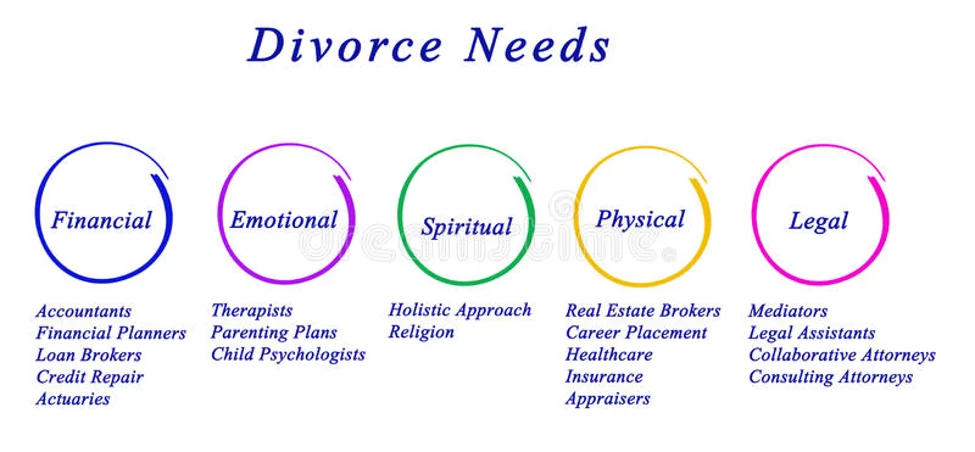If you are a member of the LGBT/same sex community in Orlando, Florida and are considering dissolving your marriage, you may be thinking your rights under the law in Florida are the same as those of a straight couple getting divorced.
LGBT Divorce • Same Sex Divorce • Gay/Lesbian Divorce
The unfortunate answer is that is not the case. Not yet, anyway.
Here is the reality: Legislation for divorce as codified in Chapter 61, Florida Statutes, has not yet caught up with the realities LGBT couples face when they decide to part ways as a married couple.
As an LGBT same sex divorce attorney here in Orlando, I’d like to share with you my opinions on where I believe Florida divorce law does and does not apply equally.
LGBT Divorce in Florida:
As you probably know, equal marriage became the law of the nation in 2015 upon the United States Supreme Court decision in United States v. Windsor.
Before 2015, there were 13 states which still did not allow equal marriage. [1] Florida was one of them. If you and your spouse became a resident of any of these 13 states after being married in an equal marriage state (or outside the country), you might not have been allowed to divorce in your state until 2015.
Today, just as you may marry in any state, you may divorce in any state, so long as you meet the residency requirement. In Florida, you or your spouse need to reside in Florida for at least six months before you may file for divorce (Section 61.021, Florida Statutes).
Before anyone can be granted a divorce in Florida, decisions must be made in four distinct marital categories:
- The division of your marital assets and allocation of your marital debts (known as the equitable distribution of marital property (Section 61.075, Florida Statutes);
- Whether and how much spousal support (alimony) is due from one spouse to the other (Section 61.08, Florida Statutes);
And if you have child/ren: - How your children will be parented and share time with the co-parents; (these details must be set down in a document called a parenting plan under Section 61.13(2), Florida Statutes);
- How much will be paid and who will pay for child support (Section 61.13, Florida Statutes);
Decisions in these four categories may be reached in two different ways:
(1) by agreement of the parties; or
(2) if the parties cannot agree, by the Judge assigned to your divorce case at a trial.
Because the law does not protect you as a same-sex spouse in the same way it does a straight spouse allowed to marry all along, I will discuss with you in detail the advantages of a settlement agreement at the end of this article.
Where Florida Law does not Apply Equally in Same Sex Divorce:
If you and your same-sex spouse were in a relationship before 2015, Florida law today does not afford the same rights and obligations in any of the four categories outlined above.
Why? Because same-sex marriages were illegal in Florida until 2015. [2]
Equitable Distribution of Marital Assets and Liabilities in LGBT Divorce:
(otherwise known as Property Division)
In every divorce in Florida, the couple’s marital assets and debts must be “equitably” (meaning fairly) divided between the spouses.
That means all assets and debts acquired by either spouse from the date of their marriage until the date the divorce petition is filed, must be divided either by agreement or by the court (Section 61.075, Florida Statutes).
This typically means each spouse will receive fifty percent of the value of a marital asset, and fifty percent of the responsibility for a marital debt.
For LGBT members living as a married couple before they were legally permitted to marry, the date of the marriage could easily create an unfair (and thus unequitable) property division between the spouses in a court of law applying the Florida divorce law as it presently stands on the books.
Keep in mind that judges, as members of the judicial branch of our government, must apply Florida legislation as it presently exists. If they do not, their decision will be over-turned by a higher court. Believe me, no judge wants that embarrassing event on their credentials.
So quite literally, a judge’s hands are tied to render decisions outside the black letter of current law, even if they see that such a decision is unfair.
In disputes involving property division, the judge in your case must strictly follow Florida law that defines marital assets and debts as property and debts acquired from the date of the marriage (in the absence of a separation agreement) until the date the divorce petition is filed.
Section 61.075(7), Florida Statutes says:
“The cut-off date for determining assets and liabilities to be identified or classified as marital assets and liabilities is the earliest of the date the parties enter into a valid separation agreement, such other date as may be expressly established by such agreement, or the date of the filing of a petition for dissolution of marriage.”
How is this unfair?
Consider for example that your now-spouse, with whom you were in a committed relationship for many years before your marriage, purchased a million-dollar piece of real estate before you were allowed to be married in 2015. This real estate would be considered non-marital property under Section 61.075(7), Florida Statutes.
Thus, you would be completely excluded from any division of this asset.
Contrast this result with a straight couple, who have been together for the same amount of years as you and your now-spouse. The only difference is the straight couple had the right to marry for the entire time they were a couple.
In this instance, the straight spouse would be entitled to an equitable distribution of this asset, which would generally be calculated as fifty percent of its value.
So, you are out half a million bucks because you were not allowed to be married until 2015.
Spousal Support in LGBT Divorce
(otherwise known as Alimony)
Like property division, the issue of spousal support is complicated in LGBT marriages where you and your spouse were together for many years before you were given the legal right to marry.
Whether your marriage is same-sex or not, spousal support can only be awarded where one spouse has a need for support, and the other spouse has the ability to pay for that support (Section 61.08(2), Florida Statutes). [3]
In addition to the threshold requirement of need versus ability to pay, the couple should be married for at least seven years to qualify for durational alimony (alimony for a set period of years), and 17 years or more to qualify for permanent alimony (alimony forever until the receiving spouse dies, remarries, or is found to be in a supportive relationship).
Section 61.08(4), Florida Statutes says:
“For purposes of determining alimony, there is a rebuttable presumption that a short-term marriage is a marriage having a duration of less than 7 years, a moderate-term marriage is a marriage having a duration of greater than 7 years but less than 17 years, and long-term marriage is a marriage having a duration of 17 years or greater. The length of a marriage is the period of time from the date of marriage until the date of filing of an action for dissolution of marriage.”
In awarding alimony, judges have discretion (meaning they are not required) to consider a laundry list of 10 other factors. A well-known example is the “standard of living during the marriage.” (Section 61.08(2)(a)–(j), Florida Statutes).
So, what happens if you were in a committed relationship with your spouse for ten years before you were given the right to marry in 2015?
The black letter law today would conclude you were “married” less than seven years; thus, there would be no legal presumption for an award of spousal support.
Can Florida courts use the other 10 factors in Section 61.08(2)(a)–(j), Florida Statutes, to consider alimony in your case?
My answer is yes, they could, and they should.
I have a special fondness for Florida Statute 61.08(2)(j), which gives Florida judges latitude in alimony cases to consider:
“Any other factor necessary to do equity and justice between the parties.”
But is this something you can hang your legal hat on? No, it is not.
Judges are not legally required to apply this factor because it is under the loosey-goosey spectrum of being “within their discretion as the trial judge,” a broad and fuzzy term that protects them from being appealed in alimony cases.
Therefore, a request for alimony at trial before a judge when you are a member of the LGBT community is little more than a crap shoot as far as what you can take to the bank.
My advice to my clients in this situation is to avoid a trial on the issue of spousal support if at all possible.
Depending on the paying spouse’s bottom line (in other words, if they are not being a miser on the subject), I encourage a settlement outside of court so that justice and equity can occur between the spouses, and to remove the expense and stress of a highly uncertain outcome at trial.

Time-Sharing of Children in LGBT Divorce
(otherwise known as Custody)
It is unfortunate that when an LGBT marriage ends badly, the spouse that has something to “gain” will often use laws which produce discriminatory results to their advantage. I have much empathy for my LGBT brothers and sisters for this sad fact.
Yet another legal category where this can occur is with your children, the most poignant and painful category of them all.
Whether you are in a same-sex marriage or not, if you and your spouse can both truly focus on what is in the best interests of your children and set your adult marital differences aside, you can work together to create a parenting plan that avoids a war over your children in a court of law.
Believe me when I say it is your children who will ultimately suffer the most if you do not do this. And the effects on your children can be lasting or permanent.
If you are going through a divorce with children, Mom’s House, Dad’s House: Making Two Homes for your Child, by Isolina Ricci, Ph.D., is a must-read whether you are in a same-sex marriage or not.
Through sometimes painful-to-read case studies about the trauma high conflict cases has on children, this book will thoroughly educate you and your spouse on how to healthfully co-parent and work through your conflicts where your children are concerned.
As you know, many LGBT couples decided to start a family before they were allowed to legally marry.

If you were living in any of the 13 states which disallowed equal marriage before 2015, it was nearly impossible to adopt because the union between LGBT co-parents was not a legally recognized union.
If the non-biological parent never legally adopted the children, Florida law would have disallowed parental rights before 2015, including visitation and time-sharing.
In cases where the couple raised their children together as they grew up, there are no words for the devastation this injustice caused the non-biological parent.
Because marriage equality is relatively new, it is impossible to predict how any given judge will rule on a case where a child is the biological off-spring to only one of the LGBT co-parents and the child has not been legally adopted. This is particularly true in LGBT paternity cases where co-parents are not married.
In straight divorce cases, Florida law presumes the husband to be the father of the children, the husband does not have to prove he is the father first.
I am hopeful Florida law will eventually reflect the same presumption in LGBT cases, but there is no guarantee of equal treatment until legislation catches up with the unequal statutory reality.
Why is it Best to Settle my Case with my Same Sex Spouse and Not go to Court?
Because of the disparity Florida law has on members of the LGBT community when divorcing, it is in your best interests to settle your case with your spouse outside of court so you have the opportunity to explore and agree upon options you would not legally be given by a judge in a court of law.
What are the best ways to settle your case outside of court? Through alternative dispute resolution. In other words, through mediated, cooperative, or collaborative divorce.

Mediated, Collaborative, and Cooperative LGBT Divorce:
(Methods for Marital Settlement Agreements outside of court)
It is important to make the distinction between the two ways the terms of your LGBT divorce become permanent.
The court, which is the judge assigned to your divorce case, will only make critical divorce decisions for you and your spouse if you and your spouse cannot reach them between yourselves.
There are amazing family law judges in Florida.
The ones I know personally will be the first to tell you, they do not want to be the ones making critical decisions for your family for two reasons:
(1) they know they do not understand the subtle nuances of your family dynamics as do you; and
(2) they know their hands are tied by the limited options given to them by the laws on the books.
In any divorce case, you and your spouse would be best served to enter into what is called a marital settlement agreement on your own free will and on terms you co- create.
This is even more important for a member of the LGBT community facing the very real legal injustices I have discussed with you here.
There are three general ways to finalize your divorce through a marital settlement agreement without having to step foot in a courtroom: (1) through divorce mediation; (2) through cooperative divorce; and (3) through collaborative divorce and family law.

Mediated and Cooperative Same Sex Divorce:
There are generally two ways to mediate your divorce.
One is where there are no lawyers representing you or your spouse, and you hire a neutral family law mediator to assist you in negotiating the terms of your divorce. This is called a pro se divorce mediation, and is the least expensive way to end your marriage through agreement with your spouse.
The second is when you and your spouse are both represented by your individual attorneys, and a neutral mediator is hired to over-come your sticking points and offer options that ultimately result in a settlement.
A mediation can also include neutral experts in other fields, such as a mental health or financial professional, in addition to the mediator. Depending on the major issues in your case, these professionals can prove invaluable in settling your case.
When using professionals in other fields along with the family law mediator, the divorce process becomes what is known as a cooperative divorce. This is a relatively new concept in divorce for which you might not locate much on-line information as of yet.
If the major issues in your case involve your children, a neutral mental health expert who specializes in family therapy can do wonders in helping your family decide difficult time-sharing and parenting issues.
In a case where the major issues are dividing complex or high marital assets and liabilities, a neutral financial advisor could be critical in guiding you and your spouse on a fair property division with the best tax consequences.
As a family law mediator who has been certified by the Florida Supreme Court, I find the cooperative divorce process to be one of the most effective means to fairly and finally resolve your divorce case.
Cooperative divorce is one of the most effective divorce processes in my opinion because it is affordable, respectful, and completely private. A far cry from what you can expect in contested litigation through the court system where the most sensitive details about your family become a public record for the whole world to see.

Collaborative Same Sex Divorce:
As a young divorce lawyer, I was constantly scratching my head over the fact that not only was I responsible for being on the cutting edge of Florida divorce law, I also was expected to be a financial planner/tax expert and a psychotherapist.
As it turned out, I was not alone in realizing that a lawyer simply cannot wear all three hats.
The Florida legislature has recently enacted the concept of collaborative divorce into law (Section 61.55, Florida Statutes). Unlike most cut-and-dried statutes, the Collaborate Law Practice Act is almost poetically written, and captures the spirit of this modern movement at long last gaining recognition as a premier process for divorcing couples:
“The purpose of this part is to create a uniform system of practice for the collaborative law process in this state. It is the policy of this state to encourage the peaceful resolution of disputes and the early resolution of pending litigation through a voluntary settlement process. The collaborative law process is a unique non-adversarial process that preserves a working relationship between the parties and reduces the emotional and financial toll of litigation.”
The collaborative divorce process involves a team of professionals who support you and your spouse in resolving the details of your divorce in a respectful atmosphere of trust.
Each of you are represented by legal counsel, who (ideally) have been collaboratively trained. Your lawyers are there to protect your legal rights throughout the process.
The team also has both a neutral mental health professional and a neutral financial professional on board. There can be other neutral professionals as necessary, depending on the issues in your case.
Your divorce is comprised of a series of team meetings with all six members of the team present. The number of meetings depends on the complexity of your assets and/or your family dynamics. There are typically at least three meetings.[4]
If you are considering a collaborative divorce in or around Orlando, Florida, we have a central-Florida based group called the Collaborative Family Law Group of Central Florida (CFLGCF).
We also have a state-wide group called the Florida Academy of Collaborative Professionals (FACP). These groups are comprised of collaboratively trained lawyers, mental health professionals, and financial professionals. [5]
There is a wealth of information about collaborative divorce on CFLGCF’s website and on the Florida Academy of Collaborative Professionals website
In April 2017, the Florida Bar first formally acknowledged the collaborative divorce process in an article in The Florida Bar Journal entitled The Collaborative Law Practice Act: The Future is Now, by Florida family law attorney Robert Merlin, Esquire.
This article is an excellent read if you want to learn the history and details of collaborative divorce. https://www.floridabar.org/the-florida-bar-journal/the-collaborative-law-process-act-the-future-is-now/
As a collaboratively trained member of both CFLGCF and FACP, I can tell you first-hand that I see beautiful, creative, and just outcomes result from the collaborative divorce process.
These outcomes support and elevate families to the highest degree possible, and could have never been reached in a court of law given the extremely limited parameters of Florida divorce law. I have found this to be true in all divorces, gay or straight.
Collaborative divorce is a kind, respectful, forward-thinking process that I believe best serves and supports divorcing spouses and their children.
As divorcing couples become more savvy about their options, I see that modern thinkers are gravitating toward this process (as well as the cooperative divorce process) as the best choice for their family.
So that your assets, your children’s best interests, and your sanity are kept firmly intact before, during, and after you are divorced.

Current divorce laws in Florida will not give same-sex spouses the same protections or responsibilities as a straight couple if you were in a relationship with your spouse before you were given the right to marry.
Because of the weight Florida law currently gives to the phrase “the date of the marriage,” there is a disparity in how rights and obligations apply to you as an LGBT couple in the issues of property division, alimony, and parental rights.
Because of this legal reality, LGBT members are typically best served by settling their divorce case outside of court. The best way to accomplish negotiating a fair settlement with your spouse without court is through alternative dispute resolution methods such as divorce mediation, cooperative divorce, or collaborative divorce.

Citations:
[1] https://www.cnn.com/2015/02/13/us/states-same-sex-marriage-ban/index.html The last 13 states to allow same sex and LGBT marriage. By Faith Karimi and Michael Pearson, CNN
Updated 1:13 PM ET, Fri February 13, 2015
[2] https://www.pewresearch.org/fact-tank/2019/06/24/same-sex-marriage/
JUNE 24, 2019 5 facts about same-sex marriage BY DAVID MASCI, ANNA BROWN AND JOCELYN KILEY
[3] http://www.leg.state.fl.us/statutes/index.cfm?App_mode=Display_Statute&URL=0000-0099/0061/Sections/0061.08.html The 2019 Florida Statutes
[4] https://www.liveabout.com/things-you-need-to-know-about-collaborative-divorce-1103296
By Cathy Meyer Updated July 14, 2017
A collaborative divorce occurs when spouses are able to work out an agreement without going to divorce court.
 Reviews
Reviews 
